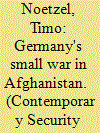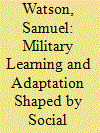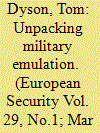|
|
|
Sort Order |
|
|
|
Items / Page
|
|
|
|
|
|
|
| Srl | Item |
| 1 |
ID:
100940


|
|
|
|
|
| Publication |
2010.
|
| Summary/Abstract |
The article analyzes the operational conduct of German forces in northern Afghanistan and the making of German strategy in the context of the International Security Assistance Force (ISAF) since the expansion of the Afghan insurgency to northern Afghanistan in 2007. It is argued that the German contribution to ISAF is characterized by a severe mismatch between politico-strategic planning and decision-making in Berlin on the one hand and operational conduct and requirements on the ground on the other. Since 2007, however, politico-strategic insistence that the German engagement in Afghanistan constitutes a contribution to a post-conflict stabilization and reconstruction effort is steadily eroding. Analysis of German operational conduct in northern Afghanistan makes evident the existing mismatch between strategy and operations, but also reveals that the deterioration of the security situation on the ground has lead to a bottom-up-development of counterinsurgency doctrine, capabilities, institutions, and modus of operandi. Operations have been driving the making of German strategy, not vice-versa, which has severely hampered German efforts to counter insurgents' progress in the north of Afghanistan.
|
|
|
|
|
|
|
|
|
|
|
|
|
|
|
|
| 2 |
ID:
186901


|
|
|
|
|
| Summary/Abstract |
Existing studies focus on explaining how militaries adapt in different ways to the challenges of war. However, organisation theory suggests that competition and normative pressure will lead overtime to convergence within particular business and policy sectors, as optimal ways of organizing and operating are learned and emulated. I examine this dynamic in the context of the conflict between the Afghan Taliban and the British Army. That there should be convergence in modes of operation or organizational form between these two very different opponents seems most improbable. Yet, as this article shows, convergence did occur as the conflict wore on.
|
|
|
|
|
|
|
|
|
|
|
|
|
|
|
|
| 3 |
ID:
165354


|
|
|
|
|
| Summary/Abstract |
The post-Cold War era has witnessed the rapid expansion of organisational learning initiatives within NATO militaries, especially formal “lessons-learned” processes. The effectiveness of national lessons-learned processes in recalibrating military activity to the demands of ongoing operations has been highly-differentiated. However, the academic literature on military change and practitioner guidance has been slow to investigate the key features of best-practice in military learning. This article breaks new ground by drawing upon the literature on dynamic organisational capabilities to explore the fundamental organisational processes and activities which are necessary to implement successful lessons-learned. It examines, in particular, the organisational features which facilitate “knowledge transformation”: the effective combination of new knowledge gained from intra- and inter-organisational learning with existing organisational knowledge. The article concludes by highlighting several potential future empirical and theoretical research agendas in military learning and the importance of engagement between lessons-learned practitioners and organisational learning scholars.
|
|
|
|
|
|
|
|
|
|
|
|
|
|
|
|
| 4 |
ID:
159438


|
|
|
|
|
| Summary/Abstract |
The regular army, rather than citizen-soldiers, drove nineteenth-century U.S. military history (apart from the Civil War). The national standing army was crucial to the defeat of Native Americans, and more important than citizen-soldiers or white pressure on Native American subsistence. Despite new circumstances west of the Mississippi River, the contexts and methods of this warfare did not fundamentally change, and learning (or relearning) and adaptation were crucial to the army’s success. The most important learning was strategic, particularly in lessons of patience, persistence, and control over the initiation and conduct of warfare, and responded to external, non-military contexts (the tug of war between citizen land hunger and tax aversion). Army learning and adaptation did not win these wars by itself, but it facilitated the effective and successful use of force at a cost the nation was willing to pay, and reduced the incidence of large-scale atrocity in comparison with operations by citizen-soldiers.
|
|
|
|
|
|
|
|
|
|
|
|
|
|
|
|
| 5 |
ID:
185342


|
|
|
|
|
| Summary/Abstract |
This article examines the development and performance of formal organisational learning processes in the Ukrainian Armed Forces (UAF) during the Donbas War (2014-present). Through original empirical research conducted with UAF personnel and documentary analysis, the article develops understanding about the detail of UAF lessons-learned processes and their effectiveness in helping to recalibrate UAF activities to operational demands. The article finds that the performance of UAF lessons-learned processes during the Donbas War has, on the whole, been poor. Since the escalation of Russian aggression in 2014, some positive steps which have been taken to implement best-practices in UAF lessons-learned processes. However, the article uncovers a number of organisational activities, structures and processes which could be improved to weaken the negative impact of bureaucratic politics and organisational culture on learning. It concludes with recommendations for the further development of UAF lessons-learned processes. The article highlights the particular importance of improving the capacity of the civilian leadership to exert effective oversight of military learning and of US and NATO support for these efforts.
|
|
|
|
|
|
|
|
|
|
|
|
|
|
|
|
| 6 |
ID:
175458


|
|
|
|
|
| Summary/Abstract |
The post-Cold War era has witnessed the widespread development of lessons-learned processes within NATO member-states. However, practitioner guidance and military innovation studies are yet to properly investigate the insights of management studies about best-practice in lessons-learned processes. In particular, they have failed to identify the activities which enable militaries to “transform” knowledge, by effectively combining new knowledge with existing organisational knowledge. Drawing upon the academic literature on cross-functional teams and original interview research, this article examines the organisational activities which improve the crucial “remedial action” phase of lessons-learned processes. It breaks new ground by identifying six key dimensions of lessons-learned process cross-functional teams and the organisational activities which enhance their performance. In doing so, the article improves understanding about the team processes and wider organisational activities which shape lessons-learned process effectiveness. It also examines the challenges associated with encouraging well-informed oversight of lessons-learned processes by the civilian and military leadership. The article concludes by identifying a number of important research agendas on lessons-learned processes.
|
|
|
|
|
|
|
|
|
|
|
|
|
|
|
|
| 7 |
ID:
173943


|
|
|
|
|
| Summary/Abstract |
Which organisational activities promote effective military emulation? Which variables facilitate and impede the emergence of these activities? Drawing upon the academic literatures on military change and management studies, as well as semi-structured interviews within the British and German militaries, this article identifies five key organisational activities which promote effective inter-organisational doctrinal learning. In doing so, the article improves understanding of the contribution that management studies can make to multi-disciplinary scholarship on military learning. The article examines the variables which facilitate the emergence of activities which support effective inter-organisational doctrinal learning through a case study of Bundeswehr doctrinal absorptive capacity during ISAF. It also explores the impact of these activities on doctrine development. The article demonstrates the crucial importance of active and well-informed civilian oversight of the activities which support military learning.
|
|
|
|
|
|
|
|
|
|
|
|
|
|
|
|
|
|
|
|
|